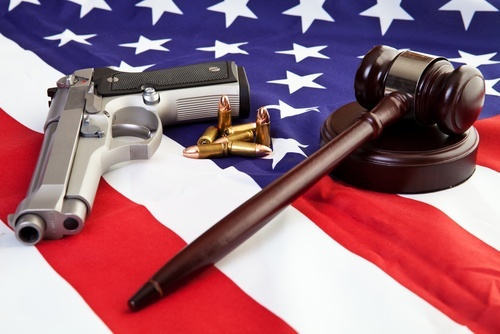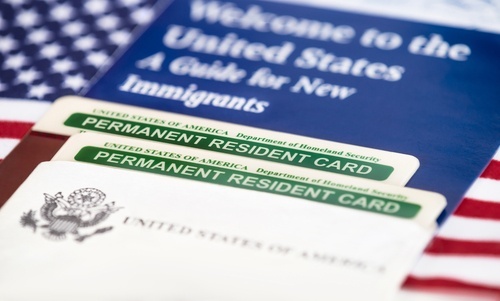Under U.S. immigration law, a conviction for a firearm offense can lead to deportation or other immigration consequences for non-U.S. citizens. For practical purposes, however, convictions for unlawful possession of a firearm in California seldom leads to deportation.
California gun crimes usually only carry immigration consequences when the offense also qualifies as:
- A crime involving moral turpitude (“CIMT”),
- An aggravated felony,
- A drug crime,
- A crime of domestic violence, or
- An offense involving an assault weapon or .50 BMG rifle.
To help you better understand how a firearm conviction affects immigration rights, our criminal and immigration lawyers discuss, below:
- 1. What gun crimes make a non-citizen “inadmissible” to the U.S.?
- 2. What firearms offenses subject a non-citizen to deportation?
- 3. How a California gun conviction affects immigration rights
- 4. When is a firearm offense an aggravated felony or a crime involving moral turpitude?
- 5. Will a firearm conviction keep me from adjusting my status?
- 6. How to fight immigration consequences of a firearm offense

1. What gun crimes make a non-citizen “inadmissible” to the U.S.?
Conviction of certain criminal offenses can make aliens “inadmissible” to the United States under the U.S. Immigration and Nationality Act. The issue of admissibility arises when someone who is not a citizen or legal permanent resident (green card holder) wishes to enter or remain in the U.S.
People who are inadmissible cannot:
- Enter the U.S. lawfully,
- Obtain a U.S. visa such as a K-1 fiance(e) visa or F-1 student visa, or
- Adjust their status to lawful permanent residence.1
The good news is that firearms offenses are NOT a category of crime that makes an alien inadmissible.
However, many firearm offenses fall into a category of crime that does lead to inadmissibility. These categories include:
- Aggravated felonies, or
- Crimes involving moral turpitude (“CIMT”).2
A firearm offense will usually fall into one of these categories only if it involves the actual use or threatened use of a gun. Simply violating a concealed or public carry law does normally count as either an aggravated felony or a CIMT.
You will also be inadmissible if you are convicted of 2 or more criminal offenses (not necessarily at the same time) and the aggregate sentences to confinement total 5 years or more.
2. What firearms offenses subject a non-citizen to deportation?
Federal firearm offenses are generally “removable” (deportable) crimes. Specifically, non-citizens can be deported for doing any of the following with any firearm or destructive device in violation of federal law:
- purchasing,
- selling,
- offering for sale,
- exchanging,
- using,
- owning,
- possessing,
- carrying, or
- attempting or conspiring to do any of the foregoing.3
Fortunately, most firearms crimes are charged under state law. And as discussed in Section 3, below, California gun crimes are treated very differently than violations of federal gun laws.
2.1. How does federal law define “firearm”?
U.S. law defines “firearm” as:
- Any weapon (including a starter gun) designed to expel a projectile using an explosive;
- The frame or receiver of any such weapon;
- Any firearm muffler or firearm silencer;
- Any destructive device; or
- Any part or accessory for any of the foregoing.4
But guns classified as “antique firearms” are expressly excluded from this definition.
A gun is generally considered an “antique firearm” if:
- It was manufactured in or before 1898;
- It is a replica of such a gun and is not designed to use any readily available rimfire or conventional centerfire fixed ammunition; or
- It is a muzzle-loading gun designed to use black powder rather than fixed ammunition.5
2.2. How does federal law define a “destructive device”?
Under U.S. law, the term “destructive device” means any explosive, incendiary, or poison gas:
- Bomb,
- Grenade,
- Rocket having a propellant charge of more than four ounces,
- Missile having an explosive or incendiary charge of more than one-quarter ounce,
- Mine, or
- Any similar device.6.
3. How a California gun conviction affects immigration rights
Unlawful possession of a firearm is seldom a cause for deportation. This is because of the United States Court of Appeals for the 9th Circuit‘s holding in United States v. Aguilera-Rios.
In Aguilera-Rios, the court held that a non-citizen is not removable for a state firearm conviction unless the crime’s definition of “firearm” is the same as under the the Immigration and Nationality Act (“INA”).7
Unlike the INA, California gun laws contain no exception for antique firearms. This means that a California gun crime could have involved an antique firearm.
The defendant is, in essence, given the benefit of the doubt as to the cause of the conviction. This applies even if the defendant’s weapon was, in fact, a handgun, rifle, shotgun or other modern, functioning weapon.
Yes – this is a legal technicality. But it illustrates just one of the reasons why a non-citizen arrested for a crime – no matter how minor it seems – should contact an experienced lawyer right away.
Example: Alicia is in California on a student visa. She has no criminal record. After a series of attacks on women in her neighborhood, Alicia purchases a handgun, which she keeps in the pocket of her jacket. Alicia is arrested and pleads guilty to Penal Code 25400, carrying a concealed weapon. Gun crimes involving handguns are deportable offenses under U.S. law.
BUT… Because California law carries no exception for antique firearms, Alicia’s conviction under PC 25400 could have involved a concealed antique firearm. Therefore, Alicia is not deportable even though her gun was actually a handgun and not an antique.
Note that a conviction under Penal Code 30600 PC, California’s law on assault weapons and .50 BMG (Browning Machine Gun) rifles is treated differently. PC 30600 contains a very specific definition of assault weapon and BMG rifle. This makes it impossible for conviction under this code section to ever be a conviction for possession of an antique firearm.
On June 4, 2021, a federal judge overturned California’s ban on assault weapons on the grounds that it violates the constitutional right to bear arms under the Second Amendment. But assault weapons remain illegal in California while the state appeals the ruling.
4. When is a firearm offense an aggravated felony or a crime involving moral turpitude?
Serious firearms offenses can lead to deportation or inadmissibility — not because they are firearm offenses but because they are considered aggravated felonies or crimes involving moral turpitude (“CIMT”).
But simple possession of a firearm is unlikely to fall into either category. Crimes involving moral turpitude are generally those “involving conduct that is inherently base, vile, or depraved…”8
And aggravated felonies are serious crimes such as those involving
- violence,
- sex,
- fraud or
- theft of large amounts.
Firearm offenses can fall into either or both categories. And if the alleged activity involves drugs or smuggling of other non-aliens into the U.S. there can be immigration consequences even when there is no conviction.

5. Will a firearm conviction keep me from adjusting my status?
A conviction for unlawful possession of a firearm does not normally keep an alien from getting a visa or receiving lawful permanent resident (green arm) status. This is because a firearm conviction is not a ground for inadmissibility under INA 212(a) unless it is also a CIMT.
But a gun crime conviction is a factor an adjudicating officer can consider in deciding whether to grant adjustment to legal permanent resident status.
Non-citizens looking to remain in the U.S. should consult with their lawyers before accepting a plea deal or diversion to minimize chances of adverse immigration consequences.
6. How to fight immigration consequences of a firearm offense
The best way to fight the immigration consequences of a firearm offense is not to be convicted in the first place.
Sometimes that can mean fighting the case at trial. Or your California criminal attorney can often persuade the prosecutor to drop the charges or to reduce them to one without immigration consequences (such as Penal Code 415, California’s “disturbing the peace” law).
But even if you are convicted of a deportable offense there may be “post-conviction relief” available.
And people who are in the U.S. legally are entitled to a hearing in front of an immigration officer before they can be deported. They are also entitled to appeal a removal order to the Board of Immigration Appeals.
Let’s take a closer look at some of the ways non-citizens can keep fighting after a firearms conviction.
6.1. Post-conviction relief for firearms offenses
A non-U.S. citizen convicted of a firearm offense may be able to have the conviction overturned if it was inherently unfair. Alternatively, the immigrant may be able to stay in the U.S. if there is a compelling reason.
“Post-conviction” relief includes (but is not limited to):
6.1.1. Writ of habeas corpus
Habeas corpus relief can be granted where there were serious errors during the criminal process. Such errors can include:
- Violation of California search and seizure laws,
- Ineffective assistance of counsel,
- Misconduct by the prosecutor, or
- A coerced confession.
6.1.2. Motion to vacate the conviction
If the immigrant was convicted in a federal court in California, the defendant can file a motion to vacate the sentence. Grounds for vacating a sentence are similar to those for habeas corpus relief.
6.1.3. Asylum and “withholding of removal” after a firearm conviction
An alien convicted of a firearm offense may be eligible for “asylum” in the U.S. Asylum can be granted to an individual who, if returned home, is likely to face government persecution due to the person’s:
- Race,
- Religion,
- Nationality,
- Political opinion or political party membership, or
- Membership in a particular social group.
Asylum must be applied for within a reasonable time of arriving in the U.S. and within one year at the latest.
You are not eligible for asylum, however, if your firearms offense was considered a “particularly serious crime.” Under U.S. law “particularly serious crimes” included:
- Any offense considered an aggravated felony, or
- Any felony or felonies for which the defendant has been sentenced to an aggregate term of 5 years or more.9
6.1.4. / U.N. Convention Against Torture (CAT) protection
People who would face persecution or torture may be able to get mandatory protection from return to their home country under The United Nations Convention against Torture and Other Cruel, Inhuman or Degrading Treatment or Punishment (“CAT”).
To qualify your crimes must be “not particularly serious” or violent. A crime is “not particularly serious” if it carries a prison sentence of less than five years.
Note that CAT protection does not keep you from being removed from the U.S. entirely. It simply keeps you from being sent to any specific country or countries where you would face likely persecution or torture.
For more information on this relief please contact our office for a free consultation.
6.1.5. “T” or “U” visas for human trafficking / serious crime victims
Immigrants who are victims of human trafficking or serious crimes such as domestic violence or sexual assault may be eligible for a “T” or “U” visa.
To be eligible, the victim must cooperate with U.S. law enforcement to investigate and prosecute the crime(s).
“T” and “U” visas allow eligible victims to remain in the U.S. on a temporary basis. The typical length of the visa is four years. Subject to certain conditions T and U visa holders can apply for a green card after they have been here for three years.
To learn more about these programs, please contact our office for a free consultation. Or refer to the U.S. Department of Homeland Security’s U and T Visa Law Enforcement Resource Guide
6.2. Can I be deported if my firearm offense was expunged?
Expungement of a conviction does not remove the conviction for purposes of immigration.
Non-U.S. citizens with deportable firearm convictions are still deportable even if their conviction has been expunged.10
But there are still benefits to getting a conviction expunged. One of the most important is that an expunged conviction does not need to be disclosed on most job applications.
6.3. Can I be deported if my firearm offense was pardoned?
No. A full and unconditional California governor’s pardon will allow a green card holder to remain in the U.S. A presidential pardon will also “erase” a conviction for purposes of removability.
But pardons can be difficult to obtain and usually take quite a while. As such, they are not usually the most effective way to fight deportation.
Charged with a firearm offense? Call us for help…

If you are a non-citizen charged with a criminal offense we invite you to contact us for a free consultation. Our California immigration attorneys know what pleas to avoid and what the changing state of the law is.
We will fight with every tool available to protect your rights and keep you free and in the U.S.
And if a family member has been arrested out of state, we also have Nevada criminal defense lawyers and Colorado criminal defense lawyers who can help.
Legal references:
- 8 U.S. Code § 1182.
- There is an exception for any crime committed: (a) when the alien was under 18 and the crime was committed (and time, if any served) more than 5 years before the date of the application date: or (b) when the maximum penalty possible for the crime did not exceed imprisonment for one year and the actual sentence handed down did not exceed 6 months.
- 8 USC § 1227(2) (C).
- 18 USC § 921(a)(3).
- 18 USC § 921(a)(16).
- 18 USC § 921(a)(4)(A).
- United States v. Aguilera–Rios (9th Cir. 2014) 769 F.3d 626.
- Morales v. Gonzales, 478 F.3d 972 (9th Cir. 2007); Navarro-Lopez v. Gonzales (9th Cir. 2007) 503 F.3d 1063.
- 8 U.S. Code 1231(b)(3)(B)(iv); Blandino-Medina v. Holder (9th Cir. 2013) 712 F. 3d 1338.
- See Matter of Marroquin, 23 I&N Dec. 705 (AG 2005).
